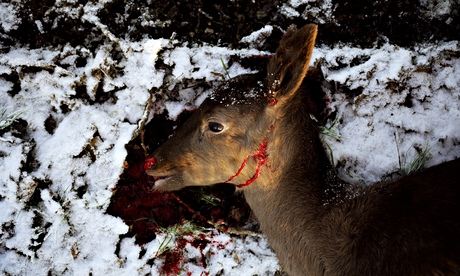
A frost-covered field, rutted with tractor tracks, gives way at the horizon to a blue-grey skyline, but the eye is drawn to smudges of red in the foreground – the bloody remains of a small animal torn apart by a much larger one. A box of eggs sits by the morning newspaper on a kitchen table covered with a vinyl tablecloth of chickens walking through a field of wild flowers. A newborn piglet slithers beneath its mother's torso on a blood-splattered metal grille. A figure is spied though a gap in the plastic folds of a vast polytunnel where daffodils are grown all year round.
These are some of the images in Andy Sewell's new photobook, Something Like A Nest, a sustained visual meditation on the contemporary English countryside – a place defined by often conflicting social and economic interests, and our reluctantly surrendered received notions of the pastoral and the sublime. Sewell makes us think more deeply about what the countryside means by attending to aspects of the rural landscape we often overlook, either because they do not fit our definitions or because we no longer spend enough time there to absorb the changes that have crept into our still green and pleasant, but increasingly managed and manicured, land. As Sewell shows in his understated way, the polytunnel and car park now define rural England as much as the rolling hill or bluebell wood.
The expansion of cities and the creeping suburbanisation that once exercised poets as diverse as John Betjeman and Philip Larkin has not quite led to the end of the countryside that the latter predicted in Going, Going: "And that will be England gone, the shadows, the meadows, the lanes." Instead, as Sewell's images suggest, the countryside has been adapted to suit whatever we demand of it, whether that be a heritage theme park or a multi-lane motorway, a National Trust building or a factory farm.
Formally, Sewell's outdoor landscapes seldom spell anything out, his eye often lighting on small details that suggest the bigger picture – that smudge of blood on the frost-white grass. In this way, Something Like A Nest is a continuation of the formally detached approach of his previous book, The Heath, in which he reimagined Hampstead Heath as a familiar but dreamlike place. Here and there, he comes across as an English Robert Adams, with meadows and lanes instead of prairies and desert trails. His portraits look wilfully staged – a female fruit-picker standing awkwardly in a polytunnel, or a woman holding a container filled with home-baked buns at a village fete. It is almost as if everyone knows they are playing a role – both for the photographer and in this highly constructed idea of the countryside.
Here and there, his images hint at older ways, lingering traditions: the towering silhouette of Guy Fawkes on a stack of pallets; plastic bags stuffed with canned foods on a church altar at harvest time. Throughout, a series of shots of kitchen windows in rural houses punctuate the narrative like breathing spaces. In each the details differ, but the sense of sameness is palpable: well-tended plants in pots stand hopeful against the wintry landscape beyond, china cups and bowls, plastic basins and bottles of washing-up liquid suggest the familiar routine of well-ordered lives. This, too, is the English countryside. Not Larkin's characteristically pessimistic vision – "all that remains for us will be concrete and towers" – but a carefully managed mundanity that undermines our notions of the rural landscape as well as our collective will to preserve it.
• Something Like a Nest by Andy Sewell (£40) is self-published and can be ordered from his website

